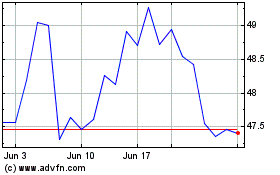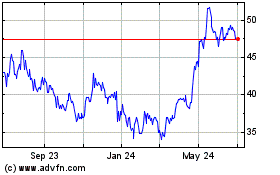Postelection Stock Rally Extends Into Asia
November 08 2018 - 12:13AM
Dow Jones News
By Ben Eisen
Markets rallied across Asia on Thursday, a day after the midterm
vote fueled the biggest postelection jump in U.S. stocks in more
than 35 years.
What's Happening
Asian stock indexes advanced, tracking the U.S. The benchmark
S&P 500 rose 2.1% on Wednesday, the largest gain in the session
after an Election Day since 1982. Some Asian indexes, including the
Kospi and the Nikkei, had closed lower in the previous session
after initially rising as the results unfolded.
Major companies were broadly higher. Tencent Holdings rose 2.1%
in Hong Kong trading, while Samsung Electronics rose 1.4% in South
Korea, and Toyota Motor climbed 1.1% in Japan.
The upswing helps reverse some of last month's declines, when
markets around the world were hit by worries about trade tensions,
rising U.S. interest rates and the potential for U.S. economic
growth to slow.
Why it Matters
The midterms helped reduce some of those fears. Market analysts
say a divided Congress, in which Democrats control the House of
Representatives and Republicans control the Senate, is likely to
slow U.S. policy-making--meaning a smaller chance of tax cuts or
other measures that could drive up U.S. borrowing costs by
stimulating more robust growth and quicker inflation.
"A split Congress is the best outcome for U.S. and global equity
markets, " said Marko Kolanovic, a quantitative and derivatives
analyst at JPMorgan Chase & Co., in a note to clients. Mr.
Kolanovic and his colleagues also say the trade feud between the
U.S. and China could de-escalate, though Congress has no direct
role in President Trump's decision on that matter.
Freya Beamish, chief Asia economist at Pantheon Macroeconomics
Ltd., said Washington is now less likely to raise tariffs on
Chinese goods as planned in January.
The trade spat has rippled through markets in Asia, helping send
Chinese stocks into a bear market and helping push the yuan to a
decade low against the dollar last month.
In turn, China has stepped in as the currency nears seven per
dollar, a psychologically significant level that could exacerbate
weakness. China's foreign-exchange reserves fell by $34 billion in
October, data showed Wednesday, signaling central-bank intervention
to bolster the yuan. That was the biggest drop in reserves since
December 2016.
Market observers say the dollar will weaken if Congress becomes
more gridlocked, which could bolster the yuan. Ms. Beamish at
Pantheon said the yuan "could still see further relief this
year."
Write to Ben Eisen at ben.eisen@wsj.com
(END) Dow Jones Newswires
November 07, 2018 23:58 ET (04:58 GMT)
Copyright (c) 2018 Dow Jones & Company, Inc.
Tencent (PK) (USOTC:TCEHY)
Historical Stock Chart
From Mar 2024 to Apr 2024

Tencent (PK) (USOTC:TCEHY)
Historical Stock Chart
From Apr 2023 to Apr 2024
